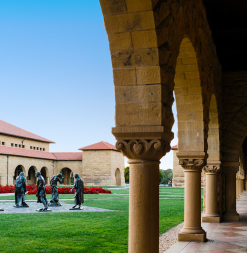Stanford Pre-Collegiate Studies (SPCS) regards honesty and integrity as vital to the academic, social, and emotional development of all participants and to build trust in a community. Truthful and ethical behavior is an essential component of the learning process. In order to maintain a positive and supportive environment in the community, participants are expected to adhere to both the letter and spirit of Stanford Pre-Collegiate Studies rules and code, as well as act respectfully towards all members of the community. Stanford Pre-Collegiate Studies is part of Stanford University. Please note that, in general, behavioral issues will be addressed within Stanford Pre-Collegiate Studies, and not through other Stanford University offices. Exceptions may be made when Stanford Pre-Collegiate Studies participants are found to have violated Stanford University rules or policies. Please note that all Stanford Pre-Collegiate Studies employees are employees of Stanford University. All employees and participants must abide by Stanford Pre-Collegiate Studies and Stanford University policies.
The following policies are applicable to all summer 2024 programs. The admitted student and a parent/legal guardian must review all sections of this page in full before accepting the offer of admission and completing the Enrollment Agreement.
All Stanford Pre-Collegiate Studies participants are expected to abide by the following Code of Conduct.
- Participants are expected to adhere to the highest standards of good citizenship, honesty, and integrity in their academic work and in their personal conduct. This includes demonstrating good digital citizenship in online interactions, and we encourage participants to take meaningful action if they witness violations of this standard, including reporting violations to Stanford Pre-Collegiate Studies personnel.
- Participants are expected to show courtesy and respect for their fellow participants, for Stanford University personnel, and for Stanford University visitors.
- Participants are expected to use language in a manner that is appropriate for a healthy learning environment. Obscene, derogatory, and abusive language is prohibited.
- Participants are expected to dress appropriately for an academic learning environment, and in a manner that reflects positively on themselves, Stanford Pre-Collegiate Studies Summer Programs, and Stanford University.
- Participants shall not take part in or facilitate discrimination of any kind, including, but not limited to, discrimination based on categories of culture, socioeconomic background, race, ethnicity, gender, gender identity, sexual orientation, disabilities, religion, intelligence, and life experience.
- Participants are expected to show respect for and take reasonable care of Stanford University property, including course materials, online instances of software owned by Stanford, and any other distributed program materials. This includes not sharing Stanford Pre-Collegiate Studies course or student life materials with people outside of the SPCS community; do not share SPCS materials with people outside SPCS, whether directly or anywhere online, and seek advice from your instructor or a staff member if you have questions.
- Participants shall not use, possess, or distribute alcohol, tobacco, vape pens/e-cigarettes, or drugs (with the exception of prescription and over-the-counter medications approved for use by the participant’s parent/legal guardian) in connection with the program. This includes prior to and during a scheduled program event, or during independent work time. Participation in an incident involving alcohol, tobacco, vape pens/e-cigarettes, or drugs is cause for immediate dismissal, even if the participant did not consume or intend to consume these substances.
- Participants are expected to be well behaved and follow the instructions of the program staff, instructional staff, and other Stanford University personnel. Unruly behavior, including causing disruptions at synchronous events, will not be tolerated.
- Participants shall not commit acts of violence on persons or property, nor shall they threaten to commit any act of violence.
- Any behavior that could expose others to a high likelihood of injury or endangerment is prohibited. This includes bullying and misuse of SPCS learning management system tools in a manner that challenges another student's safety.
- Participants shall not engage in any form of harassment, bullying, or hazing. Harassment consists of conduct of any type (including but not limited to social media, written, verbal, graphic, or physical conduct) which has the purpose or effect of unreasonably interfering with an individual’s academic or work performance, or which creates an intimidating, hostile, or offensive learning or working environment.
- Participants shall not engage in any form of sexual misconduct. Sexual misconduct includes, but is not limited to, sexual harassment; sexual assault; or any conduct with sexual overtones, which has the purpose or effect of unreasonably interfering with an individual’s academic or work performance or which creates an intimidating, hostile, or offensive learning or working environment.
- Participants shall uphold high standards of academic integrity through honesty, trust, fairness, and responsibility. Participants are expected to demonstrate a spirit of cooperation and exploration within the academic guidelines provided by their instructors, and to meet the intellectual challenges of the program through honest effort and hard work.
- Participants shall abide by all federal, state, and local laws, and Stanford University rules and regulations.
Failure to comply with the Code of Conduct may result in removal from the program, probation, or other disciplinary action, even for first time offenders. In all cases, program staff will contact parents/legal guardians to inform them of the participant's behavior and ensure a proper plan is in place for moving forward. Violations of the law may be reported to the Stanford Department of Public Safety.
All Stanford Pre-Collegiate Studies participants are expected to abide by the following Rules for Participants, which is a non-exhaustive list of expected behavior within the scope of participation.
Safety
Pranks
Participants are not allowed to instigate or participate in pranks targeted toward other program participants, staff, or participants of other programs, as well as any other Stanford University employee or visitor.
Social Media
Sometimes, personal social media use, including off-hours use, may result in disruption in the program and the program staff may need to get involved. Interactions outside the classroom or program can have a significant impact on individuals and their relationships, to the extent that classes and other activities, which critically rely on a healthy and safe environment in the program community, are disrupted. Participants are expected to participate fully in related conversations, for the safety of the community.
Interactions between minor participants and participants who are eighteen years of age are strictly limited to the live course and completion of coursework. Interactions of any kind on social media between minors and 18+ participants are prohibited.
Stanford Pre-Collegiate Studies instructors and staff are not permitted to accept social media connection or “friend” requests from current participants, parents/legal guardians of currently enrolled participants or prospective participants, or any former participants who are under eighteen years of age. To the extent that a Stanford Pre-Collegiate Studies instructor interacts with participants and/or parents/legal guardians through social media venues, such as through the program’s video conference system or professional educational sites, the instructor is not responsible for monitoring or reviewing the content or ensuring participants’ compliance with the terms of use of that social media venue.
Behavior
Attendance
Participants are required to be present during each instructional and group work session. Participants are expected to take part in all scheduled activities (class, guest lectures, activities, meetings, etc.). Only in special circumstances, and with the approval of a Pre-College Studies Programs staff member, may a participant miss a scheduled activity. Requests are typically granted for religious reasons, health reasons, or a family illness or death.
Electronics
Electronic devices such as laptops, tablets, and cell phones should only be used during program activities (both academic and student life events) for purposes directly related to the topic that the instructor or staff member is referencing. The program encourages all participants to engage fully in activities and to socialize with others in the program accordingly; therefore, use of electronic devices for social networking, emailing, talking on the phone, or playing games is not allowed during synchronous program events.
Entrepreneurial Activities and Solicitation
Participants are not allowed to sell goods or services during the program, nor are they allowed to gamble. Email or any other forms of solicitation is not permitted.
Public Displays of Affection
Participants are not allowed to publicly display affection in a way that makes other participants or staff members uncomfortable in their online space.
Privacy and Media Protection
Respecting Private Information
Participants are not allowed to distribute the contact information, image, or likeness of any Stanford Pre-Collegiate Studies participant, instructor, or staff member without explicit permission of the person (or parent/legal guardian of the participant) whose information, image, or likeness is to be shared.
Expectations of Privacy
Participants have no reasonable expectation of privacy when utilizing Stanford’s internet resources, including when using a personal electronic device on the University’s internet or wireless network. Students have no right to privacy when using Stanford Pre-Collegiate Studies or Stanford University electronic communications resources, which include Stanford-provided electronic devices and internet resources (e.g., learning management systems and online learning platforms). Stanford has the right to monitor all communications on its server.
Recordings of Class Sessions and Program Activities
Any online program activities may be recorded by Stanford Pre-Collegiate Studies. Participants may not make their own audio or video recordings of class sessions or program activities. Recordings that are provided by the program are available solely to support participation in the program, and participants are not allowed to share or distribute recordings on the internet or in any formats. Participants who require recordings of sessions for an academic accommodation should contact program staff in advance of the program to make arrangements.
Sharing Course Materials
All course materials provided by the program are intended for the participant's personal use in the program, and may not be shared or distributed.
By participating in a Stanford Pre-Collegiate Studies program, the participant and the participant’s parent(s)/legal guardian(s) agree to support any necessary inquiry of a violation of the Rules for Participants or the Code of Conduct. Consequences for violating the Rules for Participants or the Code of Conduct may include, but are not limited to, disciplinary actions such as requiring participants to write letters of apology or essays reflecting on the consequences of behavior; reflection meetings, possibly with parents/legal guardians present; probation; and/or immediate dismissal from the program. In all cases, program staff will contact parents/legal guardians to inform them of the participant's behavior and ensure a proper plan is in place for moving forward. Violations of the law may be reported to the Stanford Department of Public Safety.
Probation Process
A Stanford Pre-Collegiate Studies participant who repeatedly or seriously violates the Rules for Participants or the Code of Conduct—but not enough to warrant immediate dismissal—will be placed on probation for a specified amount of time during the program. Any decision to place a participant on probation requires the approval of Stanford Pre-Collegiate Studies Senior Staff. Once a participant has been placed on probation, any further violation subjects the participant to immediate dismissal. Additional consequences may be assigned to the participant if deemed necessary. Once the decision to place a participant on probationary status has been made, both the participant and parent(s)/legal guardian(s) will be notified and will receive a disciplinary letter from the Stanford Pre-Collegiate Studies Senior Staff.
Dismissal and Release Process
Stanford Pre-Collegiate Studies reserves the right to release a participant from the Stanford Pre-Collegiate Studies program for disciplinary and non-disciplinary reasons if the program believes the participant’s participation in the program will cause harm to, interfere with, or disturb other participants in Stanford Pre-Collegiate Studies programs, or if the program believes continued participation in the Stanford Pre-Collegiate Studies program is not in the best interest of the participant or the program. If a participant is dismissed for disciplinary reasons, a tuition refund will not be granted. If a participant is released for non-disciplinary reasons, the parent(s)/legal guardian(s) may be entitled to a partial refund. Any decision to dismiss or release a participant from the program requires the approval of the Stanford Pre-Collegiate Studies Senior Staff.
At Stanford Pre-Collegiate Studies we promote an inclusive learning environment for students from around the world. We believe that fostering a diverse community enriches learning for the next generation of global citizens. We endeavor to create inclusive educational experiences and student life programming that promotes diversity, equity, inclusion and belonging. We recognize and respect all areas of diversity, including, but not limited to, categories of culture, socioeconomic background, race, ethnicity, gender, gender identity, sexual orientation, disabilities, religion, and life experience.
Attendance Policy
Participation in Program Activities
Participants must be fully involved in the program and should be remotely present for all program classes and activities. All activities are designed to provide participants with a well-rounded experience both inside and outside of the classroom.
Commitment to the Program
Participants should not have any non-program commitments that directly conflict with required program activities. We expect participants to be fully involved in the program.
Excused Absences
Participants should communicate directly with their instructor if they need to miss class for one of the permitted reasons (medical or religious). Communication should happen in advance of the absence whenever possible. Participants cannot miss more than two classes to successfully complete the program.
Parents/legal guardians should email spcs-studentlife@stanford.edu to make a request for a participant to miss class for reasons outside of the above permitted reasons. We will review all requests and respond within one to two business days; thank you for your patience with our response.
Emergency Exceptions
For last-minute emergencies that require a participant to miss scheduled program activities, we will respond to your request as soon as we can. We will prioritize upcoming dates when reviewing requests.
Program Completion
Participants who successfully complete the program will receive a Certificate of Completion.
Generative AI is artificial intelligence that can produce various types of content. For example, ChatGPT can write essays and code. SPCS follows Stanford University’s Office of Community Standards policy regarding generative AI, which states:
Individual course instructors are free to set their own policies regulating the use of generative AI tools in their courses, including allowing or disallowing some or all uses of such tools. Course instructors should set such policies in their course syllabi and clearly communicate such policies to students. Students who are unsure of policies regarding generative AI tools are encouraged to ask their instructors for clarification. Students should acknowledge the use of generative AI and default to disclosing the use of assistance when in doubt.
Absent a clear statement from a course instructor, use of or consultation with generative AI shall be treated analogously to assistance from another person. In particular, using generative AI tools to substantially complete an assignment or exam (e.g. by entering exam or assignment questions) is not permitted. Students should acknowledge the use of generative AI (other than incidental use) and default to disclosing such assistance when in doubt.
Participants should exercise caution when using generative AI and refrain from uploading personal information or confidential data to platforms like ChatGPT.
We look forward to partnering with families of our participants to ensure holistic success in our program.
A positive and constructive working relationship between Stanford Pre-Collegiate Studies and the parents and legal guardian is essential to the fulfillment of the program’s mission.
Parents and legal guardians acknowledge that it is possible some students may be eighteen (18) years old during the program. In those circumstances, the participants who are over 18 will be attending class with, working in breakout rooms with, and attending virtual activities with participants who are under the age of 18. By submission of the Enrollment Agreement, parents and legal guardians understand their participant may have classmates who are 18, and consent for their participant to attend and participate in the program and course. Interactions between minor participants and participants who are 18 are strictly limited to the live course and completion of coursework. Interactions of any kind outside of the course, such as interactions on social media, between minors and 18+ participants are prohibited.
All parents/legal guardians are expected to help enforce the rules and code of conduct of Stanford Pre-Collegiate Studies. In addition, parents and legal guardians acknowledge and understand that sometimes it will be necessary for staff members to confidentially share information provided by participants, parents or legal guardians with other staff members and with instructors on a "need to know" basis in order to address issues raised. We maintain a strict policy of no retaliation. The program reserves the right to suspend, terminate the enrollment of a student, or decline to re-enroll a student if the program concludes in its sole discretion that the actions of a parent/legal guardian seriously interfere with the program’s mission.
Guidelines for Parent/Legal Guardian Communications with Instructors and Staff
We welcome constructive communication between program staff, instructors, and families that benefits the success of participants. You can help us achieve our mutual goal of supporting your participant by:
- Reading all program communications in a timely manner and discussing the content with your participant regularly.
- Encouraging your participant to stay aware of communication for their specific course in a timely manner and to, after reading such communication thoroughly, contact their instructor if they are unclear about an assignment or anything else related to the course.
- Encouraging your participant to communicate with their instructor by using office hours, discussion periods, email, and other identified methods provided by the instructor.
- Proactively contacting program staff via email at precollegiate@stanford.edu if you or your participant have concerns, confusion, or difficulties about program policies and procedures.
- Asking your participant how their experience in the program is going.
- Motivating your participant to advocate for their needs by submitting a Student Support Form (located on Canvas), which is read by program staff and responded to regularly.
- Setting reasonable expectations regarding response times with communication, being mindful of Pacific Daylight Time business hours and the inability of instructors to respond to individual emails during class time.
- Recognizing that live classroom sessions and all synchronous online activities are for participants, instructors, and program staff only; parents/legal guardians are not permitted in these spaces, but are welcome to ask your participant for feedback about these sessions.
Stanford University admits qualified students of any race, color, national or ethnic origin, sex, age, disability, religion, sexual orientation, gender identity, veteran status, or marital status to all the rights, privileges, programs, and activities generally accorded or made available to students at the University. Consistent with its obligations under the law, in the administration of the University's programs and activities, Stanford prohibits unlawful discrimination on the basis of race, color, national or ethnic origin, sex, age, disability, religion, sexual orientation, gender identity or expression, veteran status, marital status or any other characteristic protected by applicable law; Stanford also prohibits unlawful harassment including sexual harassment and sexual violence. This policy applies to Stanford programs and activities both on and off-campus, including overseas programs. Learn More.







